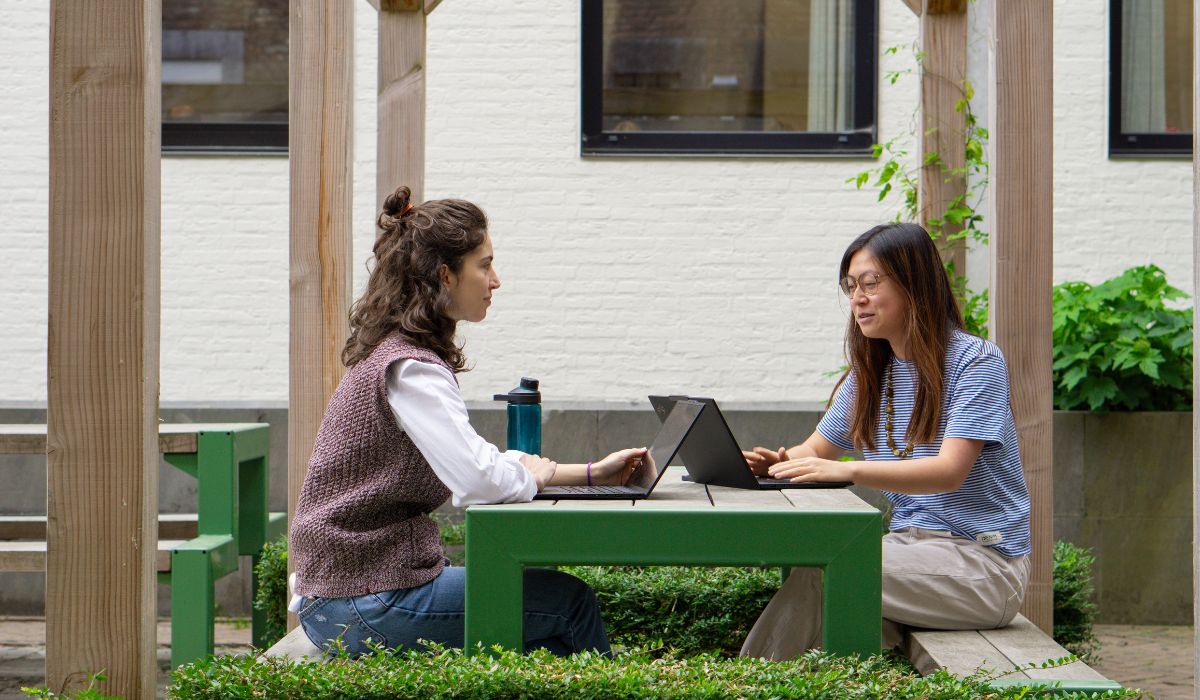At Maastricht University (UM), researchers do not have to figure it out alone. Data stewards like Penny Bollini are there to help. Not by handing over ready-made answers, but by thinking along, asking the right questions, and helping researchers make informed choices.
So, what exactly does a data steward do?
Penny supports researchers from the Faculty of Arts and Social Sciences (FASoS) in managing and organising their research data in responsible and practical ways. That can mean giving advice on how to store files securely, helping to interpret privacy rules, reviewing data management plans, or simply offering a fresh pair of eyes.
It is about making things easier, not more complicated, and showing researchers that support is there when they need it.
Did Penny always know they wanted to do this?
Not at all. This is their first full-time job. They studied sociology and linguistics and became interested in research methods and data during their studies. They created a data management plan during their studies to stay organised, simply out of personal interest and convenience.
Their deeper knowledge came later, through training provided by the University Library.
All data stewards take a data protection course that ends with an exam. It is quite intense, but it means I can confidently help researchers with questions about the GDPR and personal data.
Who do they work with?
Penny is part of a team of data stewards coordinated by the library. There is a data steward for each faculty. As a team, they meet regularly to discuss tricky cases. They never mention names, but describe the challenge and ask for input. It is a good way to learn from each other.
Privacy officers often join these discussions too. That adds another layer of expertise, and it means they can give more informed advice when similar questions come up in future.

So, how do researchers find them?
That depends. Most people get in touch by email, sometimes through the data stewards contact information page, and sometimes via the faculty research support office. They work partly at the faculty location and partly at the library, so they are usually easy to reach if someone wants to drop by or talk things through too.
But it often starts with a recommendation. Younger researchers hear about them through a funding advisor, a supervisor, or a colleague. Senior researchers, on the other hand, might only reach out when applying for funding or dealing with a data-related requirement.
What kind of questions do researchers ask, and are they always the same?
Sometimes it’s just “Where can I store this data?” Other times it’s “How do I fill out this grant section?” or “What is a data availability statement?” Penny supports researchers at every stage, including early on when they are applying for funding. They often need to explain where data will be stored, for how long, and whether it will be shared. Some funders even reward plans for data reuse or publishing.
So are the questions always the same? Yes and no. Every project is different — the topic, the methods, the data. But the answers are often quite similar. Still, the full story matters. A quick email might have a complex background. That is why they often suggest a short meeting. It helps them give advice that actually fits.
And do they make a difference?
Penny believes they do. They give an example of a time when a researcher needed to respond to a grant provider who had questions about handling personal data. They worked on the answers together, and the project ended up getting funded — something Penny found to be a very tangible contribution. Another time, a PhD candidate came back a few months after their data management plan had been written to update it with new details.
That kind of follow-up suggests that the support is seen as valuable and worth returning to for continued guidance.
Sometimes the difference is even longer term. There was one case where a researcher reached out to publish their data with a very complete set of metadata. It was clear they had received help from the previous data steward. Penny just helped carry it over the finish line.
What keeps them going?
I like the complex cases. They challenge you to find new solutions. And sometimes those cases highlight a gap in services and lead to bigger changes or new resources. But what gives me the most energy is when researchers come back. When they say a colleague told them to contact me. That’s when I feel like the work really matters. That awareness is growing.
Isn’t data just spreadsheets?
That is what many people think. People assume data means numbers in Excel. But it can be interview transcripts, audio recordings, policy documents, historical texts — anything used in research.
Each type of data has different needs. Audio recordings need secure storage. Archival documents need proper documentation. That is why support is tailored.

Where can researchers start?
A good place to start is the Research Data Management (RDM) Code of Conduct. It gives a clear overview of what to keep in mind when working with research data at UM, including areas such as storage, security, privacy and reuse. It is especially useful if someone is new to the topic or just wants to check whether they are covering the basics.
From there, researchers can explore the RDM portal in more detail, depending on their needs or questions.
One last tip?
Do not wait until it becomes urgent. If you are collecting data, thinking about publishing it, or applying for funding, just reach out. We are here to help, and a quick check-in can go a long way.
Do you have questions for our data stewards?
Please contact the data steward of your faculty. For other questions, feel free to contact the University Library via Ask Your Librarian.
Text: Lynn Snoek, Communications intern (graduation project) – UM Library
Photography: Floor van der Raadt, Communications intern (graduation project) – UM Library


0 Comments